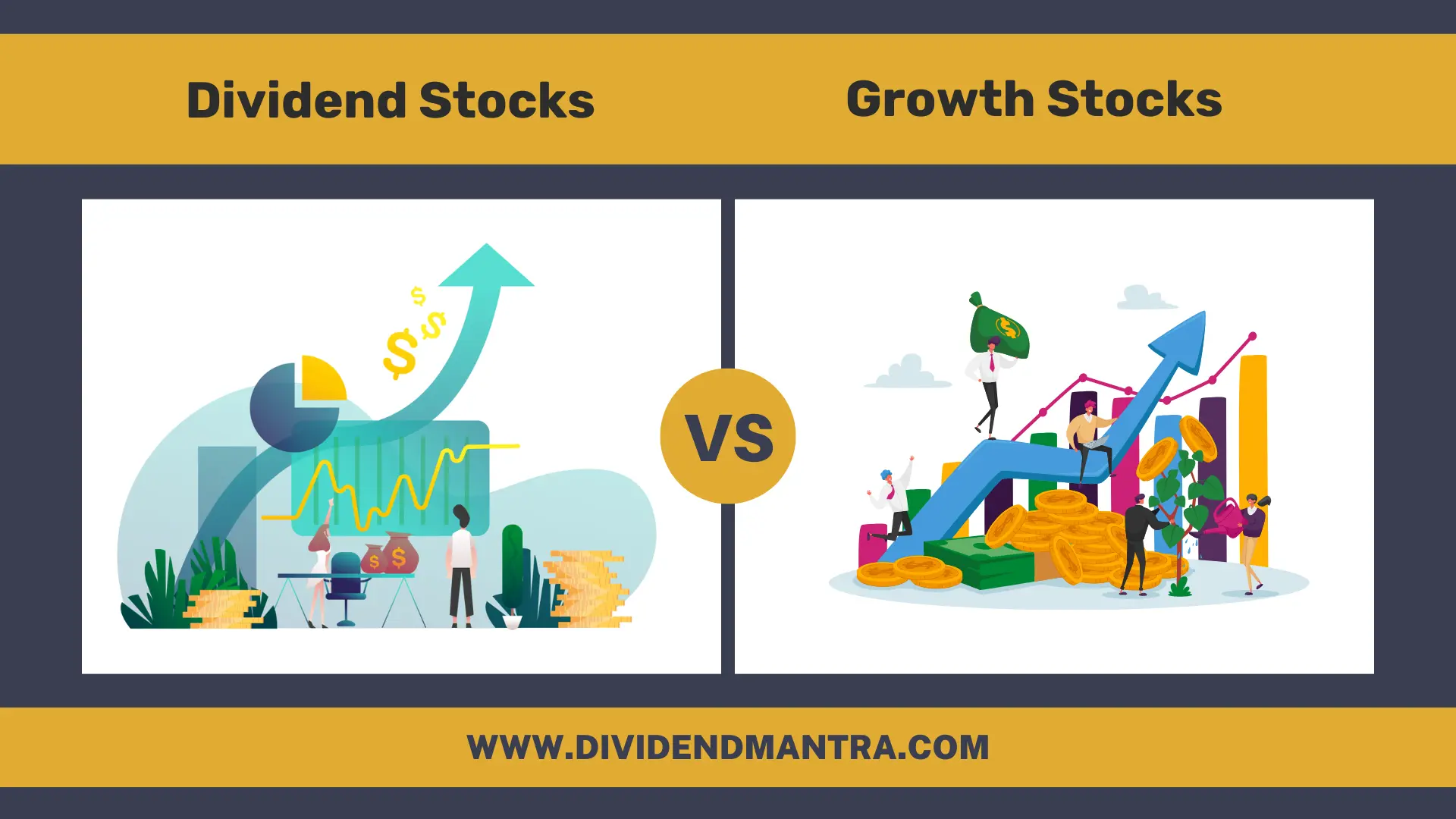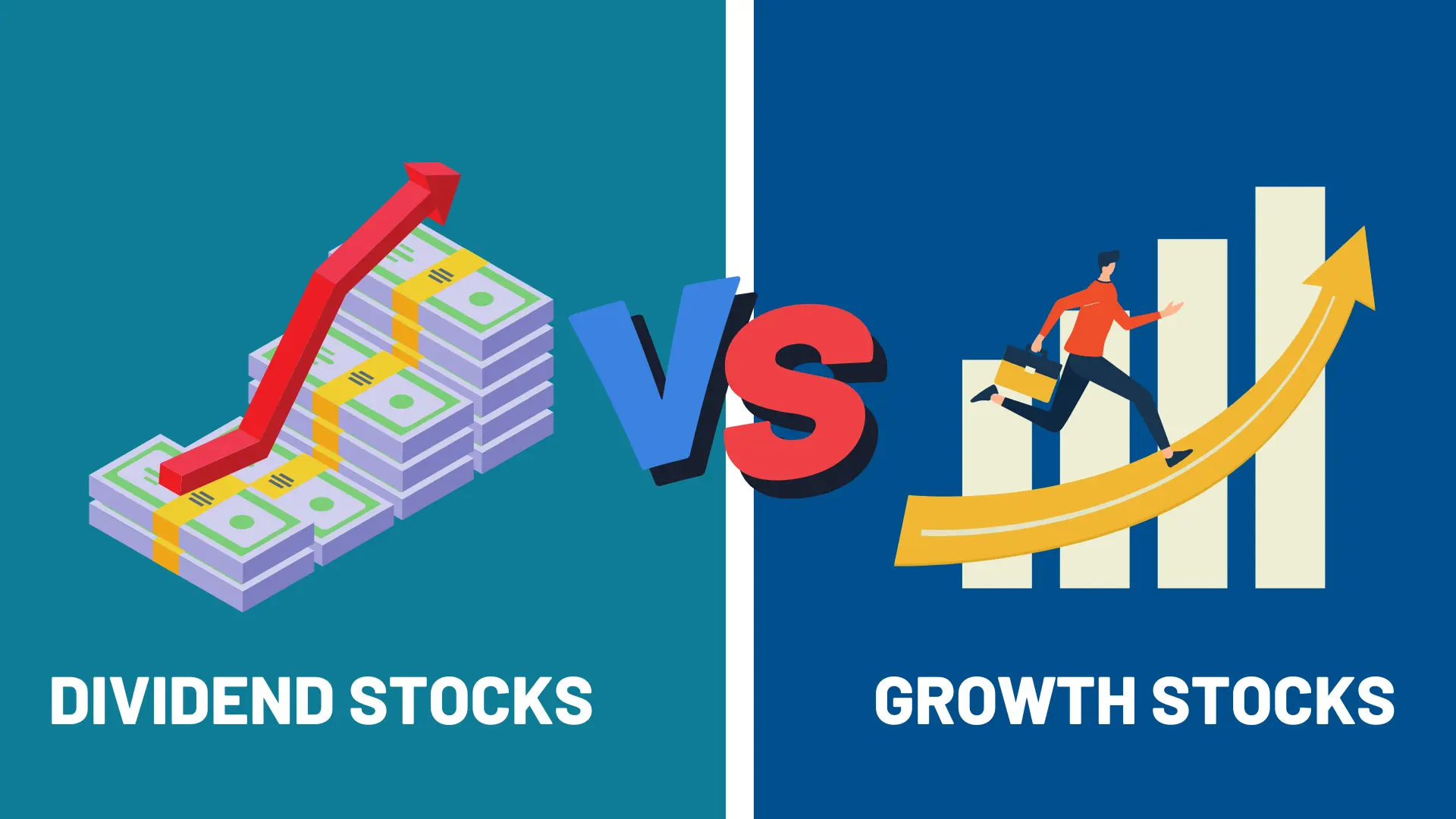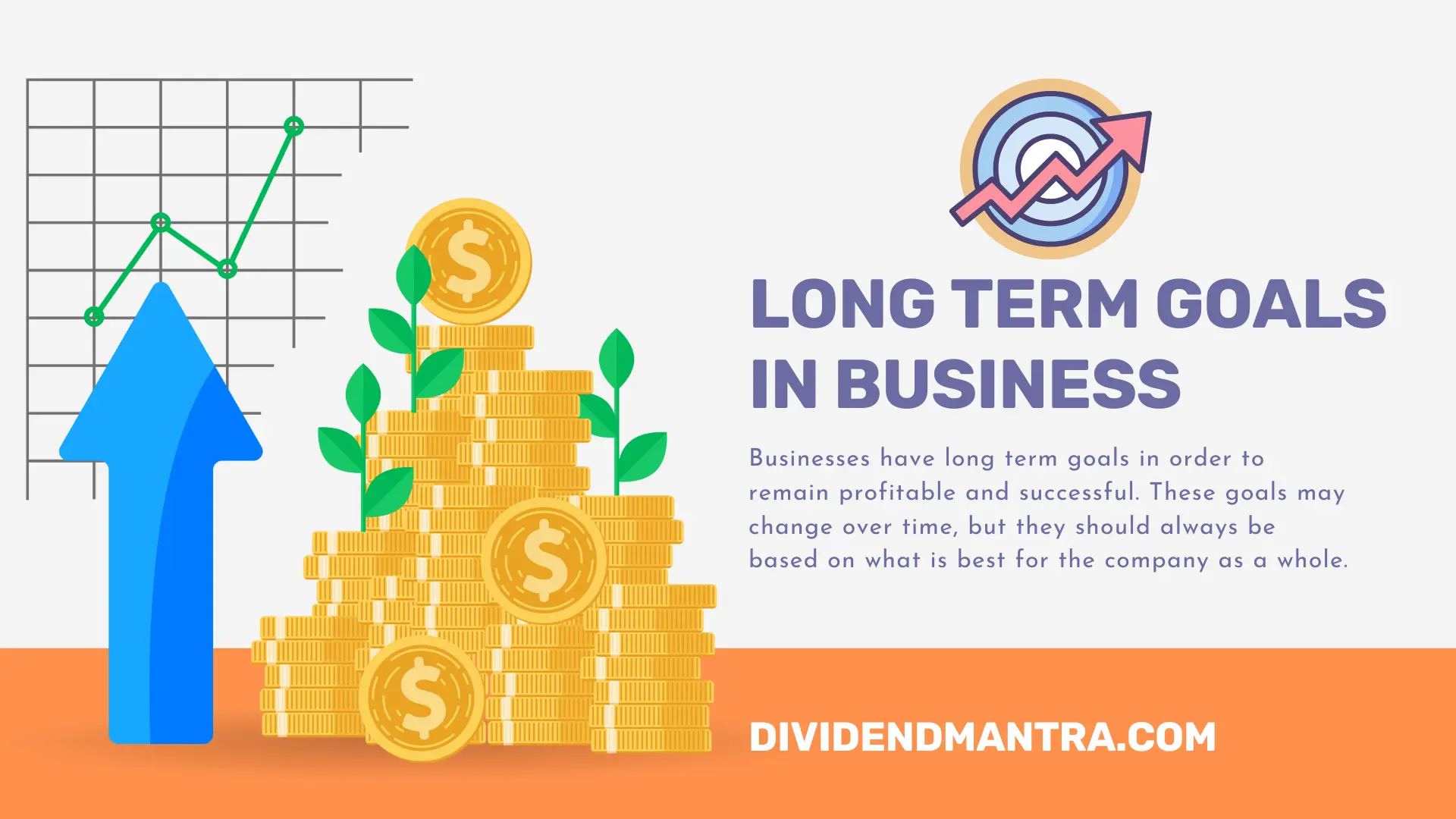Dividend Stocks vs Growth Stocks – Advantages & Disadvantages
Dividend stocks and growth stocks are two different types of investments that can be made in the stock market. Dividend stocks are stocks that pay out a dividend to their shareholders, while growth stocks are stocks that invest in companies that are expected to have high levels of growth in the future. There are pros and cons to both types of investments, and it is important to understand the differences before making a decision about which type of stock to invest in.
So which type of stock is better? We will touch on these in this article to help you make better informed decisions on your stock investment.
What Is a Dividend Stock?
A dividend stock is a type of security that pays out a portion of its profits to shareholders in the form of cash payments, called dividends. The amount of each payment, or dividend, varies from company to company and is typically based on the earnings generated by the business.
Dividend stocks can be attractive to investors for a number of reasons. First, they offer a steady stream of income, which can be helpful during periods of market volatility or when interest rates are low. Additionally, dividends can provide an opportunity for capital gains if the stock price increases over time. Finally, many investors believe that companies that pay dividends are more likely to be profitable and have strong fundamentals than those that don’t. Here is how you can earn 500 dollars per month from dividend.
What Is a Growth Stock?
A growth stock is a type of investment that is typically characterized by high earnings growth and price appreciation. The goal of investing in a growth stock is to purchase shares in a company that is expected to experience significant increases in earnings and share value in the future. Growth stocks can be found in both young and mature companies, but investors should exercise caution when investing in younger firms as they may be more risky.
One key indicator of a growth stock is its price-to-earnings (P/E) ratio. This ratio measures how much investors are paying for each dollar of earnings the company generates. A high P/E ratio typically indicates that the company is experiencing strong investor demand and is expected to continue growing at a fast pace. Conversely, a low P/E ratio may suggest that the company’s growth prospects are uncertain or that it is undervalued by the market.
The Benefits of Owning Dividend Stocks
When you invest in dividend stocks, you are investing in a company that is committed to paying out a portion of its earnings to shareholders. This payout can come in the form of cash dividends or stock dividends. Many investors prefer to own dividend stocks because of the many benefits they offer, including: Also check out, can you get rich off Dividend stocks?
- Dividend stocks offer stability and security.
- Dividend stocks have a history of outperforming the overall market.
- Dividend stocks provide a steady income stream.
- Dividend stocks are typically less volatile than other types of investments.
- Dividend stocks payouts often have tax benefits.
The Drawbacks of Owning Dividend Stocks
When you invest in dividend stocks, you are expecting to receive a steady stream of income from those investments. While this can be a very attractive proposition, there are some drawbacks to owning dividend stocks.
The first drawback is that you may not receive as much income as you expect. Dividends can be cut or eliminated altogether if the company’s financial situation worsens.
Another potential downside is that your stock price may drop if the company announces a dividend cut. This can happen even if the company is still profitable and has a good outlook for the future.
While rare, given the above, dividend stocks may be more volatile than other types of stocks. This means that they may be more likely to fluctuate in price, both up and down.
The Benefits of Owning Growth Stocks
Investors who are looking for stability and ever-growing returns may want to consider investing in growth stocks. Growth stocks are companies that are expected to experience significant revenue and earnings growth in the near future. As a result, these stocks tend to be more volatile than other types of investments, but they also offer the potential for greater profits.
Here are some of the key benefits of owning growth stocks:
- Growth stocks provide a hedge against inflation.
- They offer the potential for greater profits than other types of investments.
- Growth stocks can be a good way to build long-term wealth.
- They tend to be more volatile than other types of investments, but this also means that they can generate higher returns over time.
- Growth stocks are typically companies that are experiencing high levels of earnings growth and as a result, their share prices may appreciate at a faster rate than the overall market.
Growth stocks also offer the potential for greater portfolio diversification. Growth stocks typically have less correlation with the broader market than value stocks do and as a result, can help reduce overall portfolio risk.

The Drawbacks of Owning Growth Stocks
Many investors consider growth stocks to be the Holy Grail of the investment world. After all, these companies are thought to have high potential for future earnings and share price appreciation. However, there are a few drawbacks to owning growth stocks.
The biggest drawback is that these companies can be more volatile than other types of stocks. Growth stocks may experience big swings in their share prices as investors react to news about the company’s prospects. For example, if a growth stock announces disappointing earnings or cuts its forecast for future growth, its share price may fall sharply.
Another downside of owning growth stocks is that they can be expensive. This is because investors are willing to pay a premium for shares of companies with high potential earnings growth. As a result, you may have to pay more for a share of a growth stock than you would for a share of a company with slower earnings growth. However, they may not be as profitable as some investors expect. This is because there is no guarantee that a company’s stock will continue to grow in value. As such, growth stocks may not be appropriate for all investors.
How Do Dividend Stocks and Growth Stocks Differ?
Dividend stocks and growth stocks are two different types of investments that can be made in the stock market. As we mentioned earlier, dividend stocks are those that pay out a portion of their earnings to shareholders in the form of dividends. Growth stocks, on the other hand, are those that reinvest their earnings back into the company in order to grow the business.
The key difference between dividend stocks and growth stocks lies in how they generate returns for shareholders. Dividend stocks generate income through dividends, while growth stocks generate capital gains as the company’s earnings grow. This also means that dividend stocks are more conservative investments, while growth stocks are more speculative.
How To Choose Between Dividend and Growth Stocks
a. When To Choose a Dividend Stock
Dividend stocks may not be as flashy as growth stocks, but they can be a great choice for investors looking for stability and income. Here are three things to consider when deciding whether to invest in a dividend stock:
- The company’s history of paying dividends. Dividend payments can be unpredictable, so it’s important to make sure the company you’re investing in has a history of making consistent payments.
- The company’s current financial health. You don’t want to invest in a company that is struggling financially and might not be able to pay its dividends in the future.
- Your own financial situation. How much money do you need each month? Are you comfortable with taking on some risk in order to potentially earn a higher return? If you’re looking for stability and income, dividend stocks may be a better option than growth stocks.
b. When To Choose a Growth Stock
When is the best time to choose a growth stock and not a dividend stock? There are a few factors to consider when making this decision. Here are three reasons why you might want to choose a growth stock over a dividend stock:
1. The company is growing at a fast pace and is expected to continue this growth.
2. The company has a strong competitive advantage and is expected to stay ahead of the competition.
3. The company pays out no dividends because it is reinvesting all profits back into the business.
How Do You Decide Which Type of Stock Is Right for You?
Which type of stock is right for you depends on your investment goals. If you’re looking for a steady stream of income, then dividend stocks are a good option. If you are looking for a stock that offers high potential returns and you are willing to take on more risk, then a growth stock is a good option for you. Growth stocks typically have higher P/E ratios than other types of stocks, meaning that they may be more expensive but offer the potential for greater gains. However, these stocks can be more volatile and may not be as safe as dividend stocks.
The Importance of Diversification
Portfolio diversification is key to investors’ success. Diversifying a portfolio means owning different types of assets, which can help reduce the risk of investing in any one security. As you have seen above, when it comes to stocks, there are two main types: growth and dividend. Growth stocks are companies that are expected to have above-average earnings growth in the future, while dividend stocks are companies that regularly pay out dividends to shareholders. While both types of stocks can be rewarding investments, neither should not be considered a one-size-fits-all solution.
A well-diversified portfolio should include a mix of growth and dividend stocks. Growth stocks can provide capital gains as the company’s earnings grow, while dividend stocks can provide regular income through their dividends payments. By owning both types of stock, investors can benefit from capital gains and income potential without taking on too much risk.
FAQs
1. What Are Some of the Best Dividend Stocks To Buy?
Dividend stocks can be a great addition to any portfolio, and there are a number of good dividend stocks to buy. Some of the best dividend stocks include AT&T (NYSE: T), Johnson & Johnson (NYSE: JNJ), PepsiCo (NASDAQ: PEP), Realty Income (NYSE:O), and Procter & Gamble (NYSE: PG). These companies have strong track records of paying dividends and raising them over time.
i. AT&T (NYSE: T)
AT&T is a telecommunications giant with a market capitalization of more than $240 billion. The company has paid a dividend for more than 30 years and has raised its dividend for each of the past 25 years. AT&T currently yields 5.99%, making it one of the highest-yielding stocks in the S&P 500.
ii. Johnson & Johnson (NYSE: JNJ)
There are a few reasons why one might buy Johnson & Johnson (J&J) dividend stocks. First, J&J has a long history of paying and increasing dividends. The company has paid a dividend every year since 1887 and has increased its dividend for 54 consecutive years. This makes J&J a very reliable income stock. In addition, J&J is a well-run company with a strong brand name.
iii. PepsiCo (NASDAQ: PEP)
One reason to buy PepsiCo dividend stocks is that the company has a strong history of paying dividends and increasing them over time. PepsiCo has also been able to grow its earnings per share at a rate of approximately 7% over the past decade, which should allow it to continue to raise its dividend payments going forward. In addition, PepsiCo stock is trading at a relatively low price-to-earnings ratio of 18, which makes it an attractive investment option.
iv. Realty Income (NYSE:O)
There are many reasons to buy Realty Income dividend stocks. One reason is that these stocks offer stability and income growth potential. In addition, Realty Income has a strong history of paying dividends, and its dividend payments are highly sustainable. The company also has a very healthy balance sheet, which gives it the ability to continue making dividend payments even during tough economic times. Finally, Realty Income is a well-managed company with a proven track record of success.
v. Procter & Gamble (NYSE: PG)
There are a couple reasons why you might want to buy Procter & Gamble dividend stocks. First, the company has a long history of paying dividends, and those dividends have been increasing steadily over time. In addition, P&G is a very stable company with a strong brand name. That means it’s less likely to go bankrupt or experience major financial problems. Finally, P&G is trading at a relatively low price right now, so it could be a good investment opportunity.
2. What Are Some of the Best Growth Stocks To Buy?
There are many growth stocks to choose from when looking for potential investments. Some of the best growth stocks to consider include Amazon (NASDAQ: AMZN), Facebook (NASDAQ: META), and Google (NASDAQ: GOOGL). These companies have all shown consistent growth over the years and are expected to continue that trend in the future. They also offer investors a great deal of exposure to the tech industry, which is expected to experience significant growth in the coming years.
Another option for investors is biotech stocks. These tend to be more volatile than other types of stocks, but they can also offer much higher returns. Some of the best biotech stocks to consider include Moderna (NASDAQ: MRNA) or Celgene (NASDAQ: CELG).
i. Amazon (NASDAQ: AMZN)
Amazon is one of the fastest-growing companies in the world. It has been profitable for many years and shows no signs of slowing down. The company’s stock is also trading at a reasonable price. Buying Amazon growth stocks is a way to invest in this growth, and potentially earn a return on your investment.
ii. Facebook (NASDAQ: META)
There are a few reasons to buy Facebook growth stocks. First, the company has a large and growing user base. Its platform is popular, and it continues to add new users at a rapid pace. Second, Facebook is growing its business rapidly. The company is expanding into new markets, and its advertising revenue continues to grow at a healthy clip. Finally, Facebook is profitable and generating significant free cash flow. This gives the company the financial resources to invest in its business and drive future growth.
iii. Google (NASDAQ: GOOGL)
There are a few reasons why an investor might want to buy Google growth stocks. The company has a history of strong financial performance, and is expected to continue to grow at a rapid pace. Additionally, Google has a large market share in many key markets, which gives it a competitive advantage over other companies. Finally, the company is well-positioned to benefit from further future growth of the Internet economy.
iv. Moderna (NASDAQ: MRNA)
There are a few reasons why an investor might want to consider buying Moderna growth stocks. The company has a strong pipeline of product candidates, and is already generating revenue from its marketed products. In addition, Moderna is well funded and has an experienced management team. These factors suggest that the company is well positioned to continue growing its business in the years ahead.
v. Celgene (NASDAQ: CELG)
There are a number of reasons why an investor might choose to buy Celgene growth stocks. The company has a strong track record of growth, and its products have been shown to be effective in treating a variety of diseases. In addition, Celgene is well-positioned to capitalize on the growing demand for treatments for cancer and autoimmune diseases. The company’s management team is also highly experienced and has a proven track record of success.
Conclusion
In conclusion, dividend stocks are a more stable option for long-term investors than growth stocks. Growth stocks are more volatile and may offer a higher potential return, but they are also more risky. Dividend stocks provide a steady stream of income, which can be reinvested or used to cover living expenses. For these reasons, dividend stocks are a better choice for most investors.









